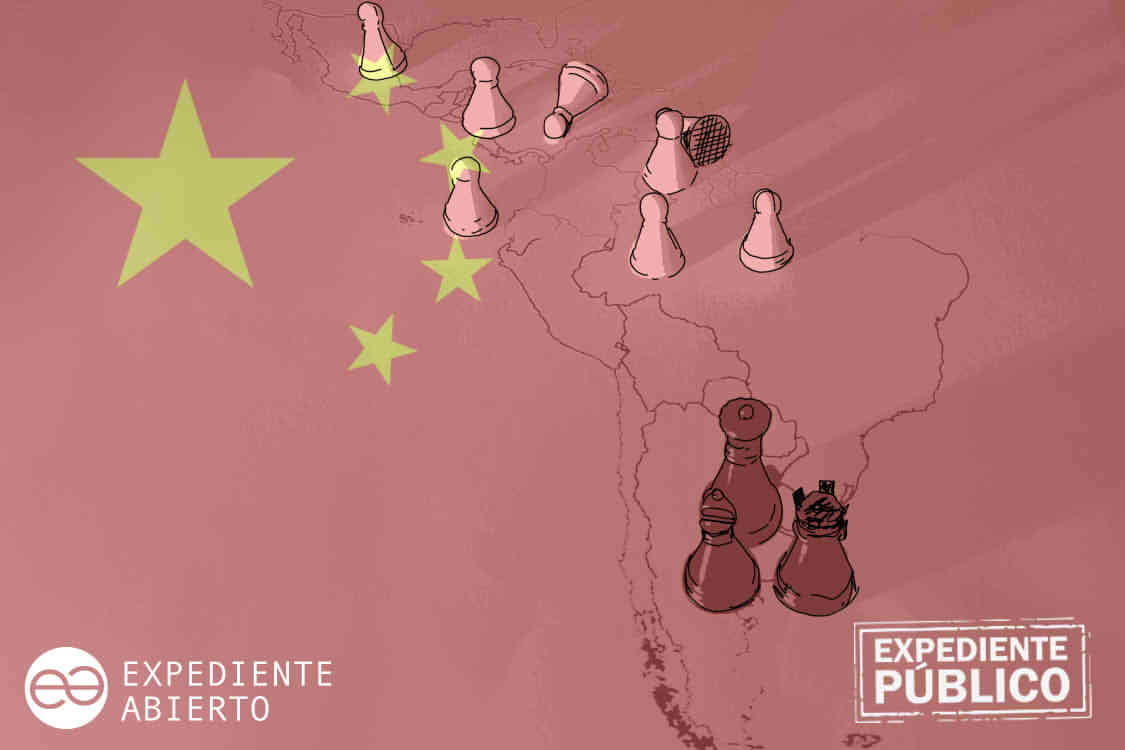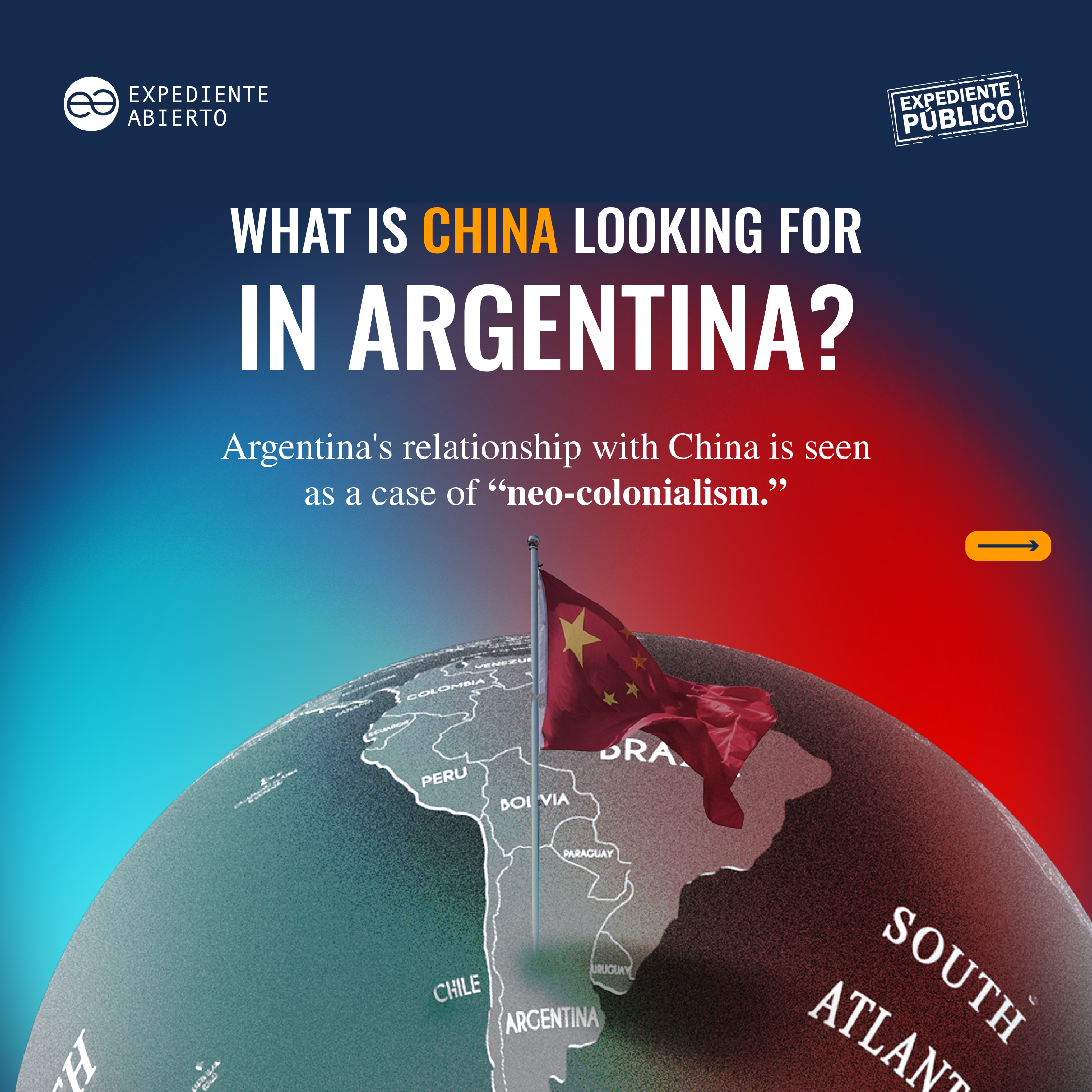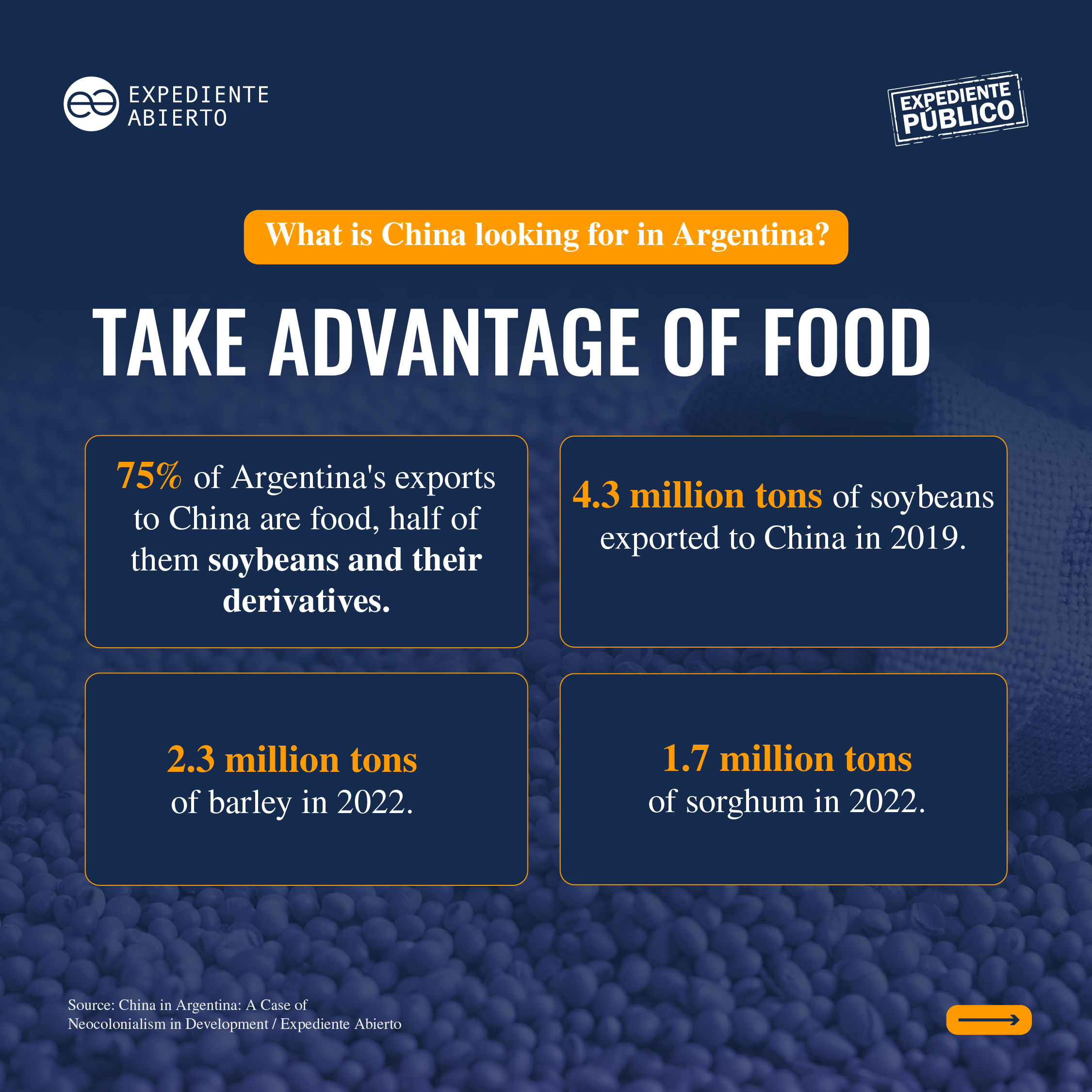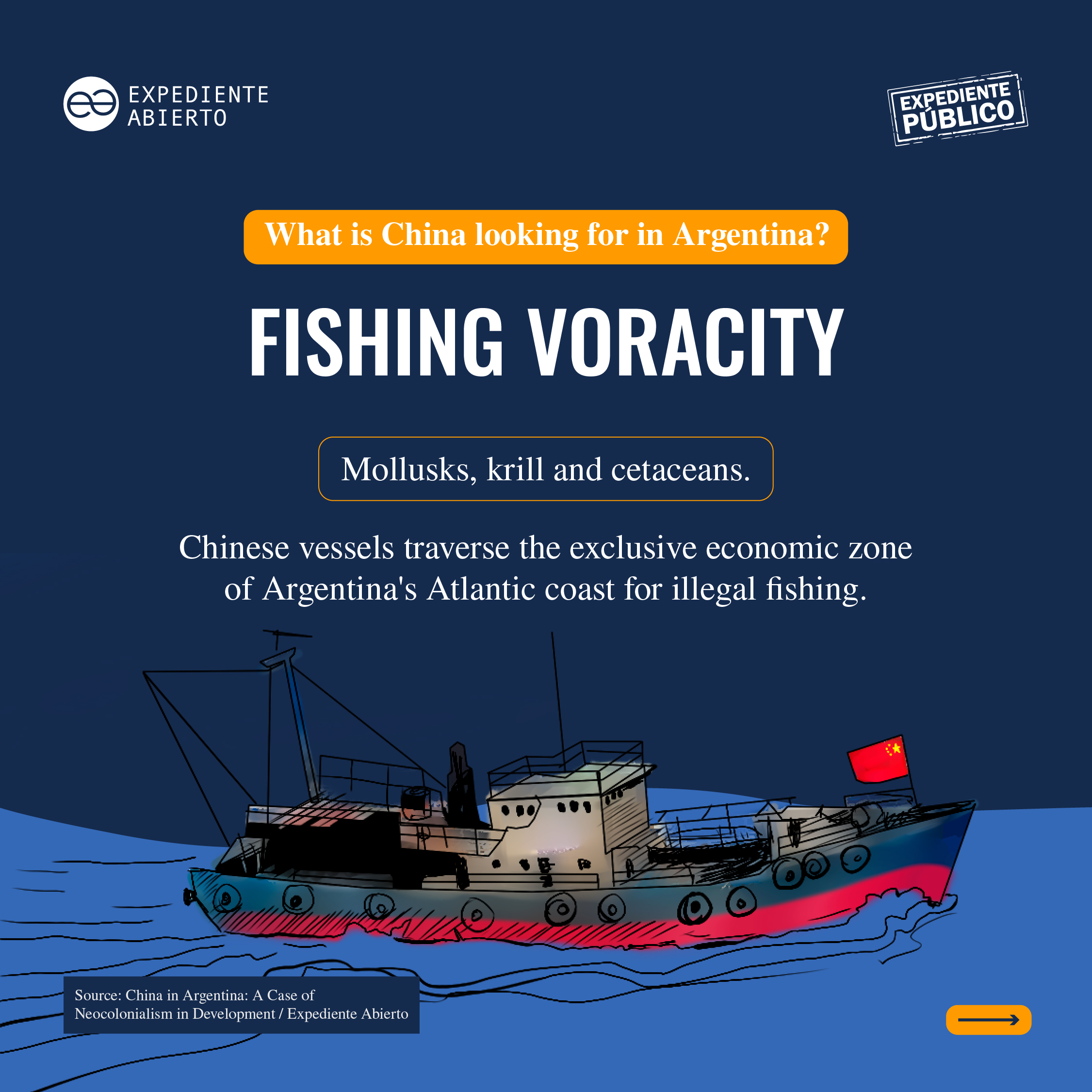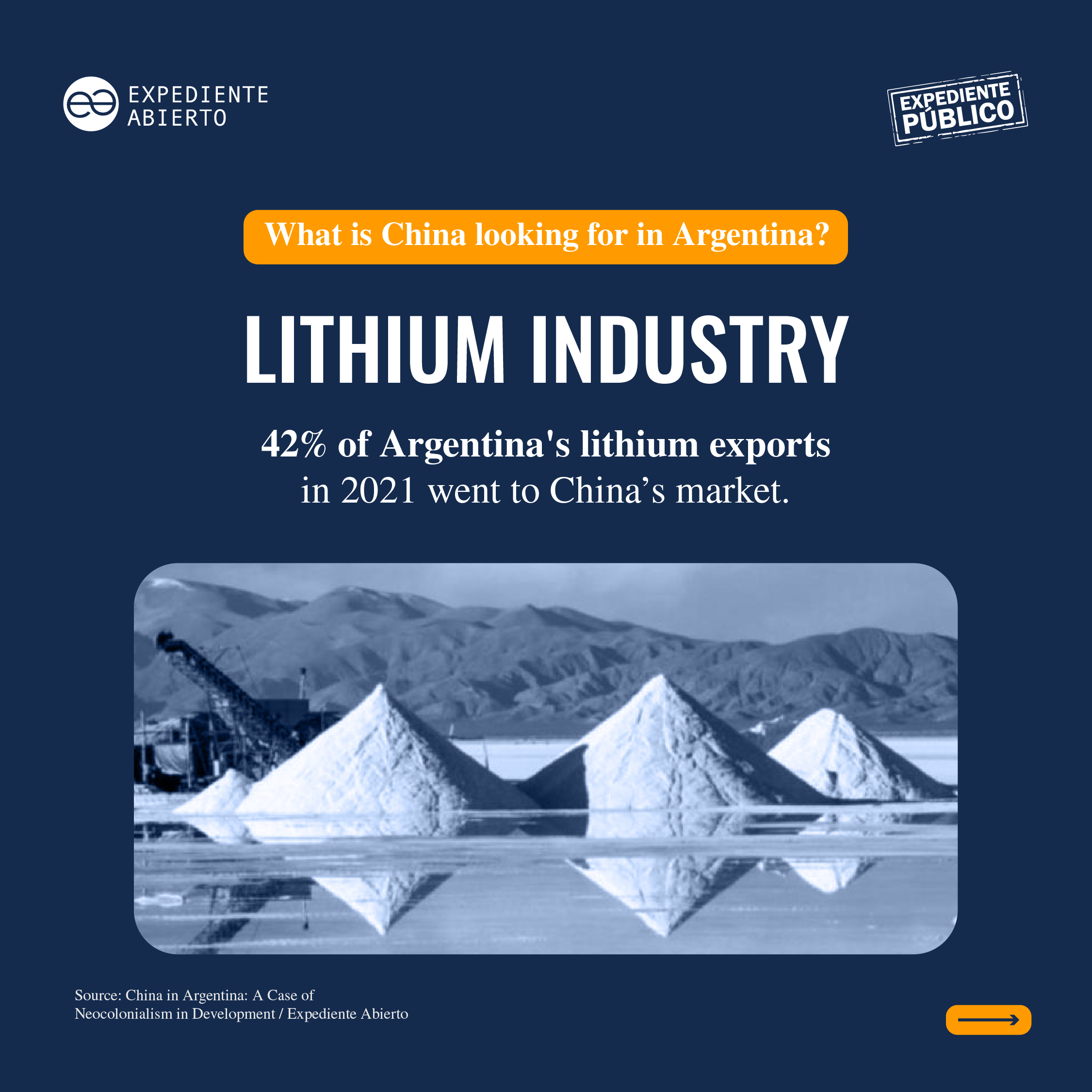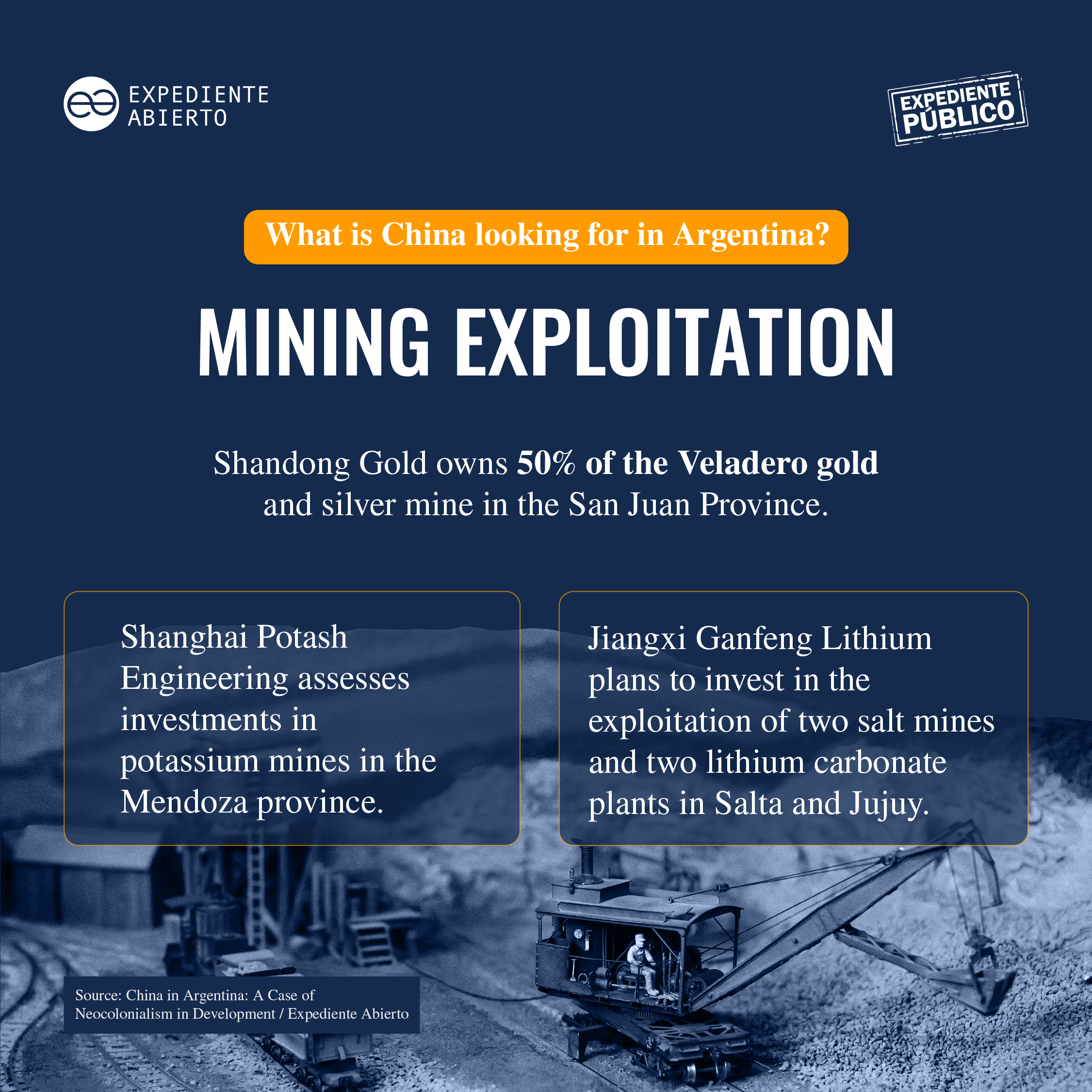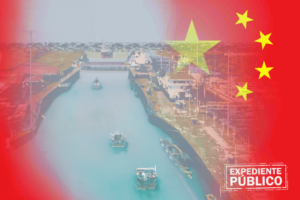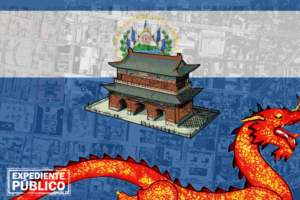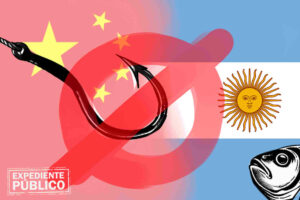*Research by Expediente Abierto shows that China applies a voracious mechanism in Argentina where it takes advantage of natural resources and seeks to lay the foundations for installed capacity in security.
** The exploitation of lithium reserves, illegal fishing activity on the Atlantic coast, and the installation of a space base in Neuquén are situations that involve “risks” for the security and sovereignty of Argentina and the region.
*** The relationship with China will be one of the “most relevant challenges for the next Argentine government,” says Ricardo Ferrer Picado, author of the report and associate researcher at Expediente Abierto.
Expediente Público
Slow, but steady has been the “neo-colonization” process of the People’s Republic of China in Argentina, a South American country where Beijing not only found the way to access a great diversity of natural resources and food on a large scale, but also a place to impose its media narrative and expand its military power as part of its global strategy.
This is the conclusion of the report “China in Argentina: A Case of Neocolonialism in Development,” published by the think tank Expediente Abierto, which shows the speed with which Beijing penetrated the South American country from an economic, diplomatic, strategic and political point of view.
The research exposes the «potential risks» of this bilateral relationship for the national security of Argentina and the hemisphere, due to China increasing its presence in the South American territory.
China has a well-marked interest in the lithium produced by Argentina, the fishing products of the Atlantic coast, and often takes advantage of commercial interests, which apparently do not cause any harm, for military purposes.
Subscribe to the Public Record newsletter and receive more information.
The greatest evidence is that the People’s Republic of China’s armed forces have access to four Argentine space facilities. “There are some areas in which bilateral ties translate into a mutual dependency relationship,” points out the research document.
Challenges of this Relationship
Strategic security analyst and author of the research, Ricardo Ferrer, states that relations with China will be part of the “most relevant challenges for the next Argentine government.”
China issued the country US$17 billion in loans between 2005 and 2022 and about US$30.6 billion in currency swaps (a financial exchange agreement in which one party pays a series of monetary flows in exchange for receiving another series of flows from the other party). “No one knows the fine print and the conditions of these debts with China,” Ferrer Picado explains to Expediente Público.
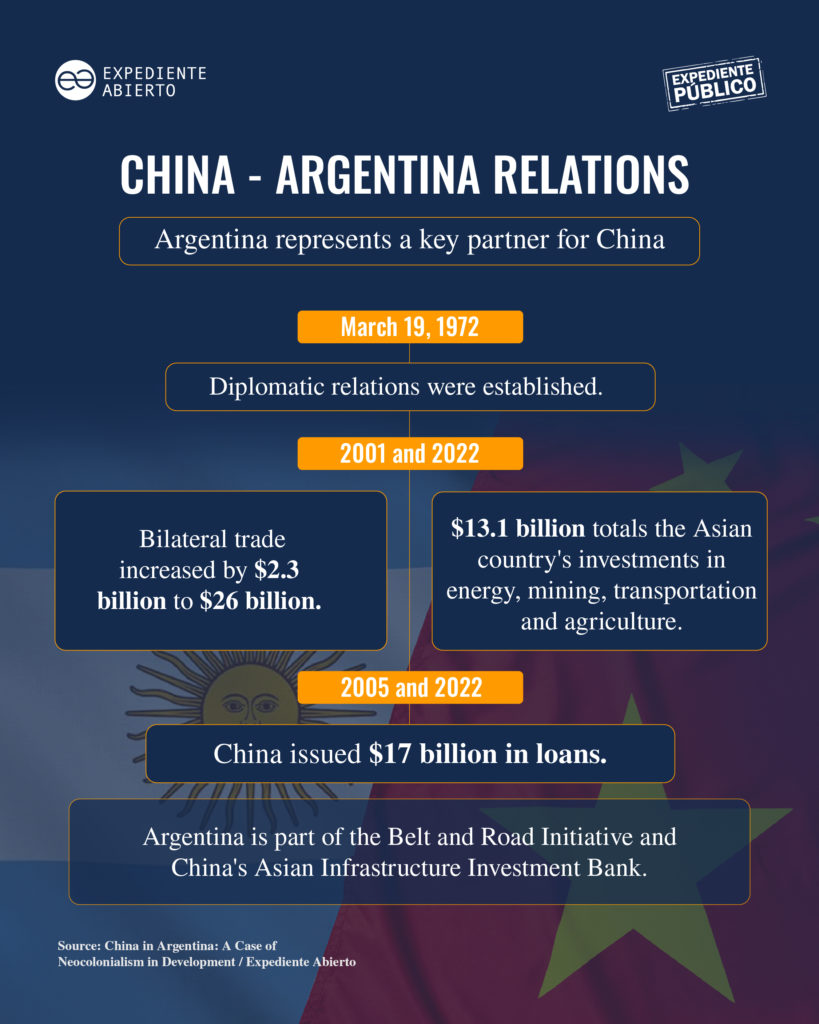
The financial clauses established by China “are secret,” contrary to the financial obligations acquired with other bodies, such as the International Monetary Fund (IMF), the World Bank, or the Inter-American Development Bank.
Also: China voraciously imposes its dominance in Latin America and Africa
«They manage the distribution of the seeds, the connectivity infrastructure to take that production to the farms where the flour is made, and in turn the infrastructure to take it to the port. In other words, if Argentina does not pay China, they have the ability to take over and limit the actions of any Argentine government,» explains Ferrer Picado.
China after ‘white gold’ in Argentina
One of Beijing’s interests in Argentina is in what specialists call the new ‘white gold’, that is, lithium production. 42% of the lithium exports that left Argentina in 2021 went to the Chinese market.
«China has plenty of lithium, however, it seeks to dominate global lithium and for that it draws on the Argentine reserves, which are a part of the lithium triangle of Latin America, so that other countries do not obtain them,» Ferrer Picado told Expediente Público.
In 2022, the battery materials companies Ganfeng Lithium and Zijin Mining, one of the largest copper and gold producers in China, multiplied their efforts to expand in Argentina, where they invested more than a billion dollars in search of monopolizing this resource.
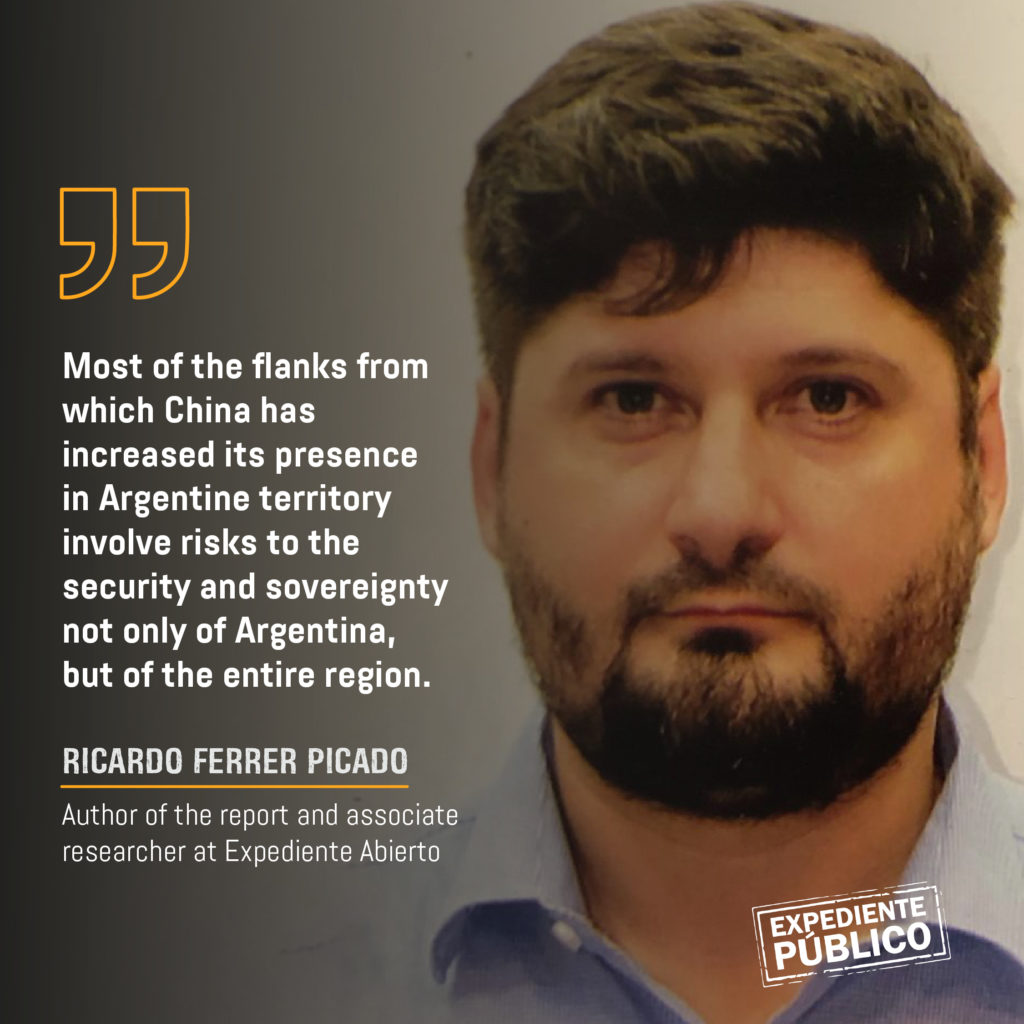
You can read: China’s relationship with Latin America: Unequal and Self-Serving
That is to say, Argentina has enormous potential in the global supply and has become a “key player within China’s supply chain.” Together with Bolivia and Chile, Argentina forms the lithium triangle in this geographical area of South America where there are robust reserves of the mineral and is the “fourth largest lithium producer worldwide.”
After the discovery of new reserves in Patagonia – a region located at the southern tip of the Southern Cone of South America and includes the territories of Argentina and Chile – as well as in the northern Argentina provinces, China deployed its “mechanisms for co-opting elites, through invitations to governors and ministers, businessmen, opposition politicians, and members of the press.”
In the first 8 months of 2023, lithium sales abroad reached US$538 million, according to a report by the Ministry of Mining. 36% of lithium exports in this period were sold to China.
Competing Chinese Companies
The “low institutional framework and lack of accountability” of Argentina’s provincial governments, which have control over the natural and mining resources, make it easier for Chinese transnationals in “environmental depredation, corruption and violations of the social and labor rights of their workers.”
The People’s Republic of China maintains a level of influence in the Americas, which it achieves through the political loyalty of several countries and by co-opting different actors, including the press, as Expediente Público has revealed in various reports.
Margaret Myers, director of the Asia and Latin America Program at the Inter-American Dialogue, explained to Expediente Público that in terms of trade, China focuses its strategy on countries that have minerals essential for clean energy technologies.
“Countries that have essential minerals for the supply chains that China has maintained in the area of high technology and construction are important, therefore, the lithium triangle in South America is very important strategically for China,” Myers mentioned.
The companies Zijin Mining and Ganfeng Lithium are in talks with Argentina’s provincial governments, national universities such as La Plata – led by pragmatic Kirchnerist officials – and the national government to install a “plant for the refinement and production of batteries for electric vehicles with tax exemptions.”
Juliana González Jáuregui, from the Latin American Faculty of Social Sciences (FLACSO-Argentina), in the framework of the Africa-Americas Forum on China held on October 12 and 13 at Florida International University, confirmed that Beijing has become a very important player in Argentina due to lithium exports.
“From 2017 to 2022, there has been an evolution and a large presence of Chinese companies that acquire lithium from Argentina, and these investments have positioned China as the country that receives the most Argentine lithium,” added González Jáuregui.
Control of Mining
Expediente Abierto shows that Chinese companies also control the gold and silver mining business in Argentina, where they make million-dollar investments.
China’s Shandong Gold Mining Co paid US$960 million in 2017 to obtain a 50% stake in the Veladero gold and silver mine in San Juan Province, where it will operate jointly with Barrick Gold Corporation to exploit resources and boost the binational Pascua Lama project.
On the other hand, the company Jiangxi Ganfeng Lithium plans to disburse US$675 million on the exploitation of two salt flats and the construction of two lithium carbonate plants in Salta and Jujuy.
Also: China forges alliances with politicians to gain hold of Argentina’s vast resources
Meanwhile, China’s Shanghai Potash Engineering is considering investing US$1.5 billion to reactivate the Potasio Rio Colorado (potassium) deposit, all because “China is the largest consumer of potassium in the world.”
According to González Jáuregui, there is a real “lack of coordination” between the central government and the provincial authorities, which particularly “seek to promote investments and get companies to come to their provinces.” “It’s a major macroeconomic problem that Argentina has,” she asserted.
Chinese fishing voracity
Expediente Abierto’s investigation exposes another phenomenon of China’s devouring capacity in the exclusive economic zone of the Argentine Atlantic coast, where Chinese vessels carry out illegal fishing activities, which entails a “depredation of endangered species such as mollusks, krill and cetaceans.”
“These activities represent a serious security vulnerability for Argentina, as ships cross the borders” totally outside the law, the think tank’s research indicates.
Illegal, unreported, and unregulated fishing (known as IUU fishing) could also contribute to the “worsening of global famines, exacerbating economic losses and sustainability risks in the region.”
Between 2018 and 2021, approximately 800 vessels passed through the exclusive economic zones. IUU fishing in Argentine territory accounts for between $1 billion and $2.6 billion each year, according to the report titled “Fishy Networks: Uncovering the Companies and Individuals Behind Illegal Fishing Globally,” the most extensive analysis of IUU cases to date.
Also: Economic alliance with China, recipe for possible disaster
The Military Advance
The military component is undoubtedly another commitment by China, and it has proceeded cautiously in Argentina. According to the investigation, the “cooperation in defense matters” is remarkable, and under that axis, Argentina would have included US$664 million in its budget to acquire military vehicles from the Asian country.
In 2015, governments signed several defense cooperation agreements that included the purchase and co-production of fourth-generation fighter jets, the acquisition of 100 amphibious armored personnel carriers, and five warships, states the Expediente Abierto document.
Beijing is simultaneously advancing together with the People’s Liberation Army in the expansion of some global strategy projects, gaining access to Argentine space facilities, including the Espacio Lejano (Deep Space) base, located in the province of Neuquén.
On August 7, 2020, the Government of Alberto Fernández promulgated in the Official Gazette – the official newspaper – the law that enabled the controversial space base in 2015, during the administration of Cristina Fernández de Kirchner.
The Deep Space base was ceded to the Chinese government for the next 50 years, where Argentine authorities have no permanent access and China uses a 16-story high antenna with the capacity to intercept U.S. satellites, space activity and encrypted communication.
On the other hand, in December 2022, the governor of the Tierra province, Gustavo Melella, signed a memorandum of understanding with the China Shaanxi Chemical Industry Group, with the purpose of building a petrochemical facility to produce fertilizers, as well as a multipurpose port that allows access to Antarctica.
Also: China targets Cuba, El Salvador and Nicaragua in its military strategy
“Mining exploitation in Antarctica is a matter of interest to China, which intends to take over the mineral resources present there,” the research adds.
Control in soybean production
Since China showed a strong interest in investing in Latin America, where a large part of the world’s food production is concentrated, it managed to penetrate the Argentine market through Cofco International, a company that is part of the holding company of the Chinese state-owned company Cofco Corporation.
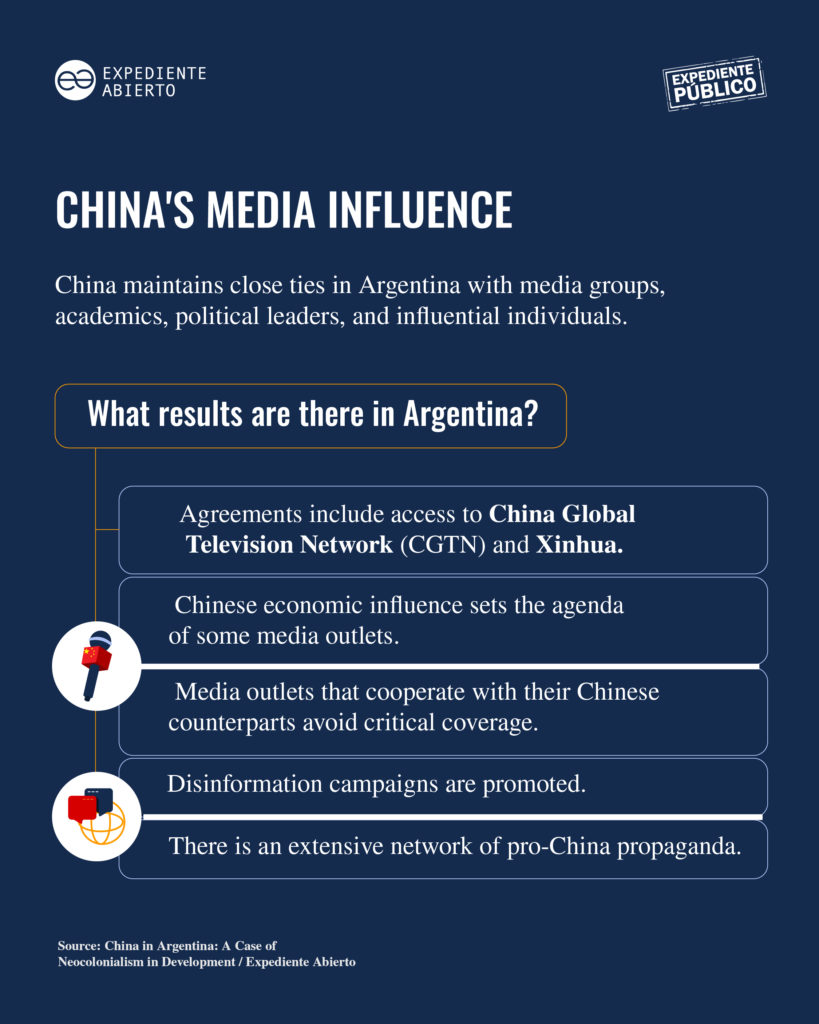
The Chinese company bought 100% of the firms Nidera and Noble Agri, two of the main cereal companies in Argentine territory.
Cofco Corporation is now the country’s leading agricultural exporter, which positions it among the firms with “the greatest potential to grind soybeans and transform them into flour and oil,” due to having an installed processing capacity of 20,500 tons per day in Santa Fe and Buenos Aires.
“Argentina’s current trade relationship with China is also complemented by political solidarities and results in a situation of dependency,” the research indicates.
Trade deficit
The commercial dynamic has allowed Argentina to bring products such as beef, sheep, and pork to the Chinese market; in addition to fruits such as cherries, citrus fruits, fresh blueberries and dried peas, tangerines, and honey in bulk and fractioned. However, the South American country has a trade deficit of US$1.291 billion within the first eight months of 2023.
While Argentina exported US$385 million, Chinese imports totaled US$1.676 billion between January and August of this year.
“The weakness of Argentina’s position lies in the fact that more than 75% of its exports to China are food, half of them soybeans and their derivatives. For this reason, it is necessary to try to export other products with greater added value,” suggests the Expediente Abierto document.
Also: China-Nicaragua FTA 2024, another footprint of the dragon in Latin America
The Strategy Moving Forward
China seeks to expand its presence in Argentina and does so through a series of agreements created by the Belt and Road Initiative. This initiative includes large-scale media operations.
In Argentina, the incidence of Chinese propaganda has increased steadily in recent years and Beijing’s “economic influence” marks its agenda in which “Chinese state-party propaganda” is promoted.
While some Argentine journalists prefer “self-censorship,” very few media outlets report on cases that clearly involve Argentine politicians at all levels and all parties and companies in the People’s Republic of China.
“Most of the flanks from which China has increased its presence in Argentine territory involve risks to the security and sovereignty not only of Argentina, but of the entire region,” adds the report by Expediente Abierto.
Over the years, China has promoted disinformation campaigns in Argentina as a “counterintelligence mechanism that seeks to generate confusion in decision-making.”
The Asian country, according to the research, has a well-marked interest that motivates it to aggressively break into the South American country.
“It has the possibilities to do so and has found the opportunity in the face of Argentina’s economic shortcomings (…) The anti-Americanism of the Argentine political class that reigned during the Kirchner government, who are currently in power, and economic necessity – the two factors are in favor of China and it knew how to take advantage of them,” says Ferrer Picado.

